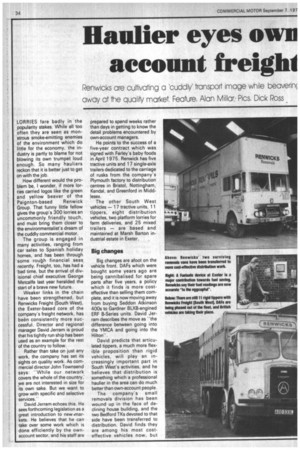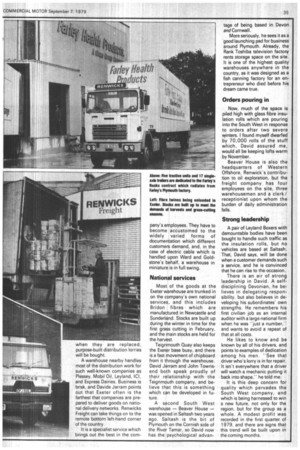Haulier eyes owl] account freighi
Page 36

Page 37

If you've noticed an error in this article please click here to report it so we can fix it.
Renwicks are cultivating a 'cuddly' transport image while beaverinc away at ne quality market. Feature: Alan Millar: Pics. Dick Ross _
LORRIES fare badly in the popularity stakes. While all too often they are seen as monstrous smoke-emitting enemies of the environment which do little for the economy, the industry is partly to blame for not blowing its own trumpet loud enough. So many hauliers reckon that it is better just to get on with the job.
How different would the problem be, I wonder, if more lorries carried logos like the green and yellow beaver of the Paignton-based Renwick Group. That funny little fellow gives the group's 300 lorries an uncommonly friendly touch, and must bring them closer to the environmentalist's dream of the cuddly commercial motor.
The group is engaged in many activities, ranging from car sales to Spanish holiday homes, and has been through some rough financial seas. recently. Freight, too, has had a bad time, but the arrival of divisional chief executive George Metcalfe last year heralded the start of a brave new future.
Weaker links in the chain have been strengthened, but Renwicks Freight (South West), the Exeter-based core of the company's freight network, has been consistently more successful. Director and regional manager David Jerram is proud that his tightly run ship has been used as an example for the rest of the country to follow.
Rather than take on just any work, the company has set its sights on quality work. As commercial director John Townsend says: "While our network covers the whole of the country, we are not interested in size for its own sake. But we want to grow with specific and selective services.'
David Jerram echoes this. He sees forthcoming legislation as a great introduction to new .markets. He believes that he can take over some work which is done efficiently by the ownaccount sector, and his staff are prepared to spend weeks rather than days in getting to know the detail problems encountered by own-account managers.
He points to the success of a five-year contract which was signed with Farley's baby foods in April 1975. Renwick has five tractive units and 17 single-axle trailers dedicated to the carriage of rusks from the company's Plymouth factory to distribution centres in Bristol, Nottingham, Kendal, and Greenford in Middlesex.
The other South West vehicles — 17 tractive units, 11 tippers, eight distribution vehicles, two platform lorries for farm deliveries, and 25 mixed trailers — are based and maintained at Marsh Barton industrial estate in Exeter.
Big changes
Big changes are afoot on the vehicle front. DAFs which were bought some years ago are being cannibalised for spare parts after five years, a policy which it finds is more costeffective than selling them complete, and it is now moving away from buying Seddon Atkinson 400s to Gardner 8LXB-engined ERF B-Series units. David Jerram describes the move as "the difference between going into the YMCA and going into the Hilton".
David predicts that articulated tippers, a much more flexible proposition than rigid vehicles, will play an increasingly important part in South West's activities, and he believes that distribution is something which a professional haulier in the area can do much better than own-account people.
The company's small removals division has been wound up in the face of declining house building, and the two Bedford TKs devoted to that side have been transferred to distribution. David finds they are among his most costeffective vehicles now, but when they are replaced, purpose-built distribution lorries will be bought.
A warehouse nearby handles most of the distribution work for such well-known companies as Plessey, Mobil Oil, Leyland, ICI, and Express Dairies. Business is brisk, and Davide Jerram points out that Exeter often is the farthest that companies are prepared to deliver goods on national delivery networks. Renwicks Freight can take things on to the remote bottom left-hand corner of the country.
It is a specialist service which brings out the best in the corn
pany's employees. They have to become accustomed to the widely varied forms of documentation which different customers demand, and, in the case of electric cable which is handled upon Ward and Goldstone's behalf, a warehouse in miniature is in full swing.
National services
Most of the goods at the Exeter warehouse are trunked in on the company's own national services, and this includes Bridon fibres which are manufactured in Newcastle and Sunderland. Stocks are built up during the winter in time for the first grass cutting in February, and the main stocks are held for the harvest.
Teignmouth Quay also keeps the Exeter base busy, and there is a fast movement of chipboard from it through the warehouse. David Jerram and John Townsend both speak proudly of their relationship with the Teignmouth company, and believe that this is something which can be developed in future.
A second South West warehouse — Beaver House — was opened in Saltash two years ago. Saltash is the bit of Plymouth on the Cornish side of the River Tamar, so David now has the psychological advan tage of being based in Devon and Cornwall.
More seriously, he sees it as a good launching pad for business around Plymouth. Already, the Rank Toshiba television factory rents storage space on the site. It is one of the highest quality warehouses anywhere in the country, as it was designed as a fish canning factory for an entrepreneur who died before his dream came true.
Orders pouring in
Now, much of the space is piled high with glass fibre insulation rolls which are pouring into the South West in response to orders after two severe winters. I found myself dwarfed by 70,000 rolls of the stuff which, David assured me, would all be keeping lofts warm by November.
Beaver House is also the headquarters of Western Offshore, Renwick's contribution to oil exploration, but the freight company, has four employees on the site, three warehousemen and a clerk! receptionist upon whom the burden of daily administration falls.
Strong leadership
A pair of Leyland Boxers with demountable bodies have been bought to handle such traffic as the insulation rolls, but no vehicles are based at Saltash. That, David says, will be done when a customer demands such a service, and he is convinced that he can rise to the occasion.
There is an air of strong leadership in David. A selfdisciplining Devonian, he believes in delegating responsibility, but also believes in developing his subordinates' own strengths. He remembers his first civilian job as an internal auditor with a Large national firm when he was "lust a number," and wants to avoid a repeat of that at all costs.
He likes to know and be known by all of his drivers, and points to examples of dedication among his men. "See that driver who's lorry is in for repair. It isn't everywhere that a driver will watch a mechanic putting it back into shape,'" he told me.
It is this deep concern for quality which pervades the South West company, and which is being harnessed to win a new future, not only for the region, but for the group as a whole. A modest profit was recorded in the first quarter of 1979, and there are signs that this trend will be built upon in the coming months.












































































































































